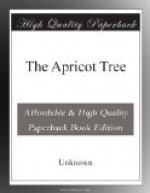“I think,” she observed, when he concluded, “that all Tom’s sin in this matter came from breaking the tenth commandment. If he had not first coveted the apricots, he would not have been tempted to steal them. Through earnestly desiring what did not belong to him, he was led not only to commit a great sin himself, but to be the means of leading a fellow-creature into sin also. Fred Morris would not have thought of robbing the apricot-tree had not Tom put it into his head. In the Bible we are frequently charged not to lead our brother into sin; and heavy punishments are denounced against him who shall cause another to do evil.”
“I used to think, grandmother,” observed Ned, “that the tenth commandment must be the least important of all; I did not suppose there could be any very great harm in merely wishing for what belongs to another person; but I shall never think so in future.”
Several weeks passed away, and the weather began to grow cold and winterly. Ned could not help sighing when he saw his grandmother suffering from the cold, and recollected that she had no cloak to keep her warm, and would have none all the winter.
He sometimes sighed, too, as he looked at the apricot-tree, whose branches were now dead and withering; and so did Tom. Both the boys agreed that it had better be cut down, and taken away entirely.
“How I wish,” exclaimed Tom, “that we had another to put in its place!”
“So do I,” rejoined Ned; “but apricot-trees, I believe, are very dear to buy. A gardener my father used to work for, and who is now dead, gave me this. I fear there is no chance of our ever getting another.”
“How I do wish I was rich!” cried Tom; “I would give you an apricot-tree, and all manner of things besides. I should like to be as rich as our Squire best; but it would do to be as rich as Farmer Tomkyns. Oh, if I had only half as many sheep, and pigs, and cows, and haystacks, as he has, how happy I should be! Don’t you wish you had some of the Squire’s or Farmer Tomkyns’s riches, Ned?”
“No,” replied Ned, “I don’t; because we ought not to wish for other people’s things.”
He then told Tom all that he could remember of what his grandmother had said to him about the sin of coveting what does not belong to us; and that doing so, besides breaking one commandment, is very likely to lead to the breaking of others also.
“But,” asked Tom, “how is it possible to help longing sometimes for things we have not got, and yet see other people have?” “We may not,” said Ned’s grandmother, who had come out to call the boys in to tea, and had overheard the latter part of their conversation; “we may not, perhaps, be always able to prevent covetous or envious thoughts from entering our mind; but we should directly endeavour to drive them away, and pray to God to make us contented with ’that state of life in which it has pleased Him to place us.’ ’Be content with such things as ye have,’




